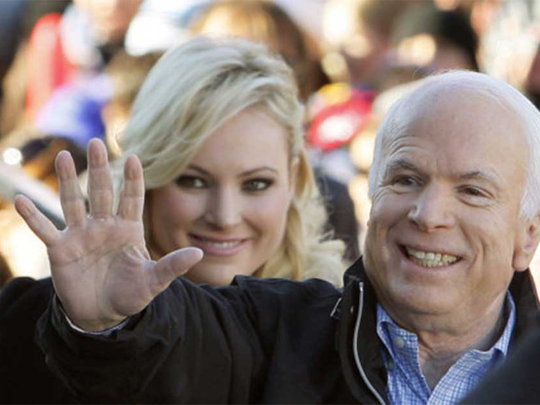
Many otherwise hard-boiled political reporters still fondly recall their moments with Senator John McCain, Republican-Arizona, on the Straight Talk Express, the low-spin, laughs-filled campaign bus of his losing 2000 presidential try. My travel memories with the senator are no less evocative, if perhaps not quite as rollicking: slogging through a muddy refugee camp in Serbia, say, or listening to the anguished testimony of exiled Belarusian dissidents in a government building in Vilnius.
Year after year, to no particular political advantage, McCain has travelled to distant, lightly touristed corners of the world, dragging along whatever senators or members of Congress he could, no matter their party or ideological persuasion. Meanwhile, the McCain Institute for International Leadership gives temporary shelter in Washington, DC, and Arizona to democratic activists from those same distant corners.
At a time when US global leadership is in doubt as never before in the modern era, we have something to learn from that commitment.
McCain being McCain, when I asked him during a recent conversation in his Senate office why he devotes so much energy to such trips, he shied away from grand pronouncements and began telling stories instead. About the time he helped head off a Russian-inspired coup in the tiny Balkan nation of Montenegro. About walking through Tripoli, Libya, with US Ambassador Christopher Stevens in 2012 as dozens and then hundreds and thousands of Libyans gathered, honking their horns and shouting, “Thank you, USA,” for America’s part in overthrowing Muammar Gaddafi.
Moral support
About meeting with former political prisoners in Myanmar who began to cry when they heard his voice — having heard him, on the Voice of America, speak up for human rights. “So the reward is mine, not theirs,” McCain told me.
Like many people, I’ve been alternately cheered and disappointed by McCain’s stances on domestic matters over the years — admiring when he helped save Obamacare a few months ago, disappointed when he went along with the Republican tax-cutbill this month.
But McCain has never wavered in his support for democracy and human rights, and in his conviction that the US needs to provide moral support to those who fight for freedom around the world. With President Donald Trump often expressing more admiration for dictators than for democratic leaders, McCain’s advocacy has become lonelier — and more essential. His advocacy isn’t always successful, as his anecdotes make clear. Libya slid into civil war, and Stevens was killed two months after that election-day stroll through Tripoli. Myanmar, though former human rights icon Aung San Suu Kyi is nominally in charge, is presiding over the ethnic cleansing of the Rohingya people.
“The easy part is the revolution,” McCain said. “The hard part is democracy. . . . The trend is obviously in the wrong direction.”
One reason, he said, is “the lack of American leadership,” which he believes accelerated under president Barack Obama. For the most part McCain tries to restrain his criticism of the incumbent, though the occasional acerbic remark slips out. “Maybe we ought to have a rule that [national security adviser H.R.] McMaster has to be up and about by 5 am,” he suggested to me, for example.
But he does not disguise how worried he is by the deeper currents that recall to him the darker movements of the 1930s: the nativism, the assaults on freedom of the press and the rule of law, the blaming of foreign competition for all ills, the rise of extremism.
“I worry about the polarisation that’s going on here, I really do,” McCain said. “The terms of the debate is what is really disappointing.
“The other day I was flipping the channels, and I saw [Steve] Bannon just beating the crap out of [Mitt] Romney,” he continued, alluding to Bannon’s attacks on Romney for his service as a Mormon missionary in France during the Vietnam War. McCain, who more than did his part in Vietnam, made clear he didn’t share Bannon’s view. “I didn’t think there was anything wrong with serving your church. I had no idea that was a crime.”
Then McCain, who is fighting a brain tumour and who briefly returned to the hospital not long after our conversation, paused for a moment to gather his thoughts.
“Could I also say — I still believe that we’re the best nation on Earth,” he said. “I still would not bet against the United States of America. I still would rather be the US than any of these other countries.
“But we’re going through some very choppy waters,” he said. “We’ve got to appeal to the better angels of our nature.”
— Washington Post
Fred Hiatt is the editorial page editor of the Post.










